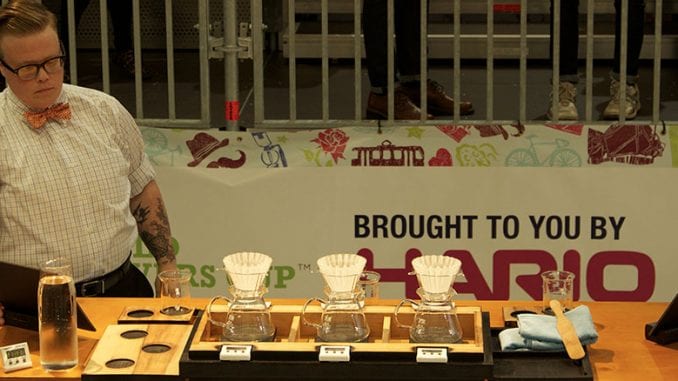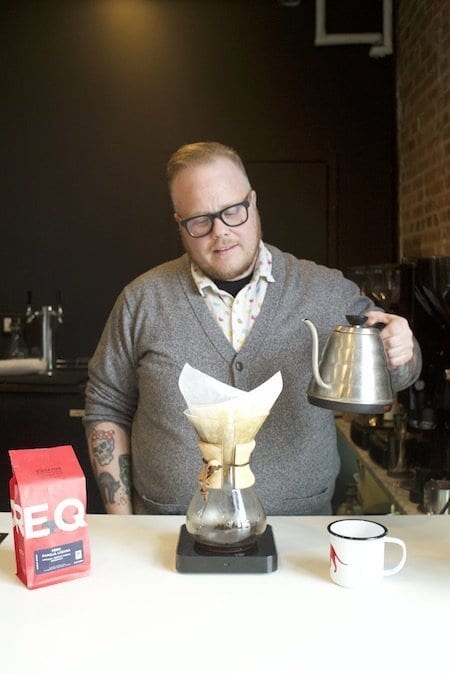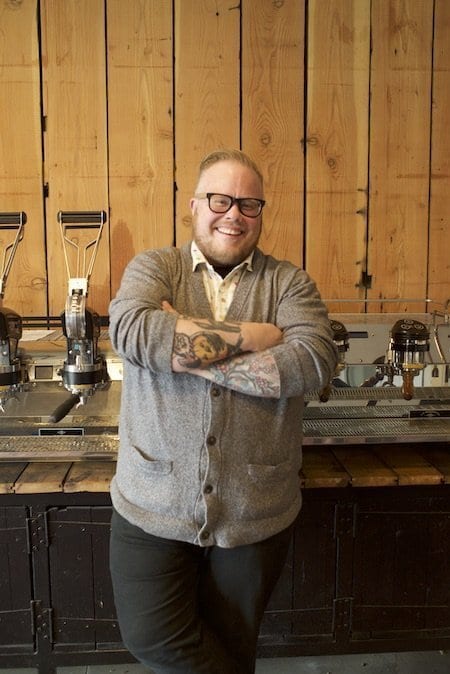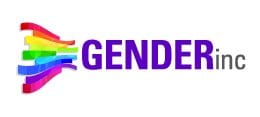
2013 World Brewers Cup Champion James McCarthy shares some firsthand experience and advice on bettering the workplace as a transitioning employee or ally employer.
BY MARK VAN STREEFKERK
BARISTA MAGAZINE ONLINE
Cover photo courtesy of Coffeephotolife
From the editor: Earlier this summer, we featured a series on LGBTQIA+ topics in honor of Pride Month; our coverage continues through an interview with coffee professional James McCarthy, an active ally and member of the community.
2013 Brewers Cup Champion James McCarthy has a lot to say about making the coffee community safer for its transgender and nonbinary members. James, who uses he/him and they/them pronouns interchangeably, got his start in the industry in 2003 at Gimme! Coffee in Ithaca, N.Y. They worked there for seven years, along with a brief roasting role in between at 1000 Faces Coffee in Athens, Ga.
“When I started in coffee as a barista, I knew I was trans and my friends did, but nobody at work did, so that was one thing. … When I moved back (to work at Gimme!), I was like, ‘Well I’m definitely going to come out,’” James says, remembering that coming out was received positively among his colleagues, but being misgendered by customers in a front-facing service position was “so painful and so exhausting. It’s amazing how it can just so quickly deflate (your mood).”

Now roasting for Equator Coffees & Teas, James has some tips and advice for making specialty coffee safer for transgender and nonbinary people. For starters, when ringing someone up for coffee, he suggests that you shouldn’t assume the name on a customer’s debit card is the name they go by. You can always ask, which is also an opportunity to introduce yourself.
For people transitioning on the job, James says, “There is only a certain amount of energy that you have for the day, so be easy on yourself because if you are having to negotiate everything that people who aren’t transitioning on the job have to negotiate, as well as this other thing (being misgendered), then it’s going to take a lot more energy whether it’s emotional or physical, because it can be kind of physically wearing, too, to be stressed out all the time. Be gentle with yourself; I feel like I’m talking to younger me too, thinking about this.”

When James came out at Gimme! Coffee, coworkers would ask what they should say if someone misgendered him.
“To be honest, I always felt super uncomfortable being asked that question,” they say. “What felt good was for someone to take the initiative and say, ‘Actually, James uses he/him (at the time).’ I would have preferred that they just corrected people.”
For employers, it’s important to note that every trans person has different needs. Asking what they need to feel comfortable in the workplace is important, but the trans person(s) on your team shouldn’t be your only source of education.
“There’s so much that a person of marginalized experience will want to share and do, but yeah, it’s emotional labor when you have to educate people, especially when you have to educate your employer. So I think that employers should think about paying that person, or having that person recommend somebody to consult,” James suggests. They recommend The Transgender Training Institute and Gender Inc., or employers can look up local LGBTQIA+ consultants in their region. Looking for a place to start your own research before working with a consultant team? We recommend this article from Barista Magazine Online by RJ Joseph, as well as A Quick & Easy Guide to They/Them Pronouns by Archie Bongiovanni and Tristan Jimerson.

Educating management and staff about transgender and nonbinary issues has ripple effects outside of the café. James says, “Really try to educate yourself. Even if that person works in coffee, maybe they have a friend or a sibling who is a nurse. You know what I mean? Or a family member who is a fireperson. … If you teach yourself in order to make your workplace environment better, you can also kind of stand up for trans people in the rest of your life. And that’s kind of where it becomes a life or death thing, you know what I mean? Not letting jokes pass, right? Not normalizing transphobia by not saying anything.”

ABOUT THE AUTHOR
Mark Van Streefkerk is Barista Magazine’s social media content developer and a frequent contributor. He is also a freelance writer, social media manager, and novelist based out of Seattle. If Mark isn’t writing, he’s probably biking to his favorite vegan restaurant. Find out more on his website.
